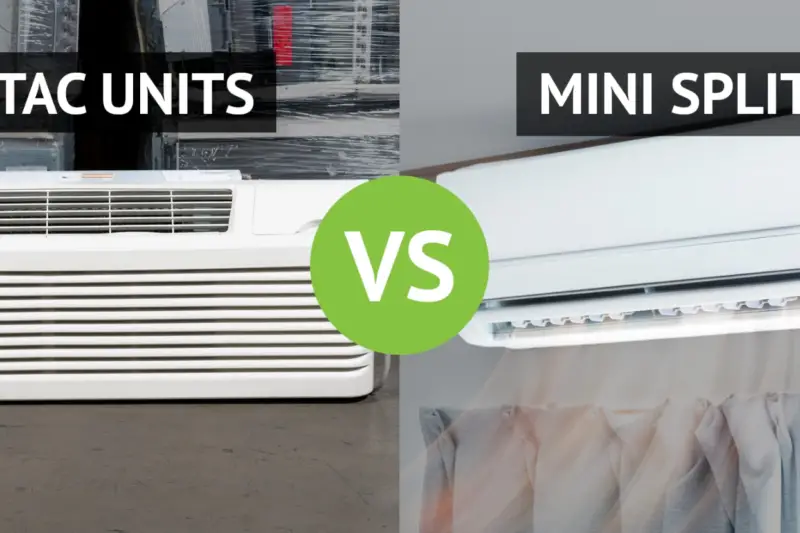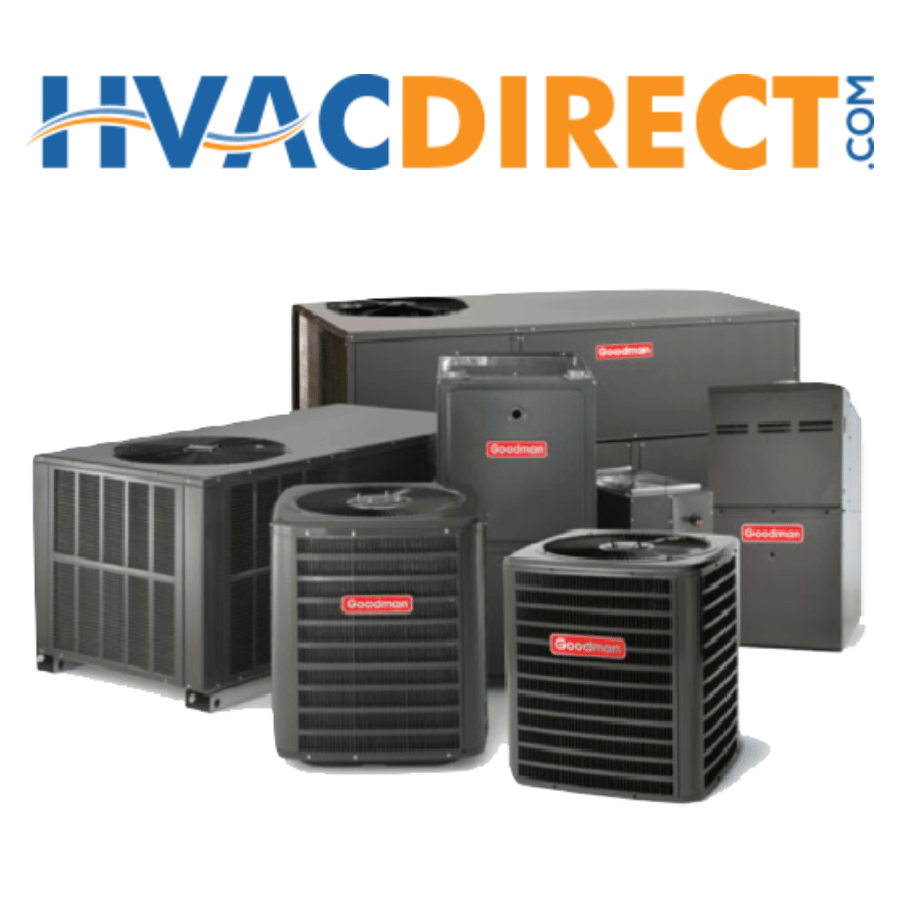What Is The Difference Between A Standard Ptac Unit And A Heat Pump
Did you know that heating and cooling account for about half of the energy usage in an average American home? It’s a staggering statistic that highlights the importance of choosing the right HVAC system. When it comes to heating and cooling, two popular options are standard PTAC units and heat pumps. Understanding the difference between these two systems is crucial in making an informed decision for your home. What is the difference between the standard PTAC Unit and a heat pump?

Let’s start by discussing PTAC units, which stands for Packaged Terminal Air Conditioners. These units are commonly found in hotels, apartments, and office buildings. They provide both heating and cooling through a single device installed through an exterior wall. One key feature of PTAC units is their simplicity – they have separate controls for temperature, fan speed, and mode settings. However, one common problem with PTAC units is their noise level, as they can be quite loud during operation.
On the other hand, heat pumps are a more versatile option that not only provide efficient heating but also offer cooling capabilities. Heat pumps work by transferring heat from one area to another using refrigerant gases. This means that instead of generating heat like traditional furnaces or boilers do, heat pumps extract heat from outside air or even underground sources such as groundwater or soil. This makes them highly energy-efficient options for both heating and cooling needs.
In conclusion, whether you’re considering a standard PTAC unit or a heat pump for your home’s HVAC system, knowing the differences between these two options will help you make an informed decision. While PTAC units are simple and commonly found in commercial settings, heat pumps offer greater versatility with their ability to cool as well as efficiently transfer heat. If you’re thinking about “I’m in urgent need of PTAC air conditioner repair near me as my unit has stopped cooling, and the summer heat is unbearable.” So if you value energy efficiency and want a system that provides both heating and cooling capabilities without sacrificing comfort or freedom of choice, then a heat pump might be the ideal solution for you.
What is the difference between a standard PTAC unit and a heat pump
A standard PTAC unit, short for Packaged Terminal Air Conditioner, operates by blowing warm or cool air into a room to regulate the temperature. It does this through a combination of heating elements and refrigeration cycles. On the other hand, a heat pump works differently. It draws in warmth from the outside environment, even when it seems cold, and transfers it inside to warm up the space.
The main difference between a standard PTAC unit and a heat pump lies in how they generate the desired temperature. While a PTAC unit relies on internal heating elements and refrigeration cycles to produce warm or cool air, a heat pump utilizes an advanced mechanism that extracts heat energy from the outside air, ground, or water sources using refrigerant coils. This process allows heat pumps to provide highly efficient heating capabilities even in colder climates.
Transitioning into common problems with PTAC units can be challenging as these systems are generally reliable and versatile. However, like any mechanical device, they may experience issues over time due to wear and tear or improper maintenance.
Common problems with PTAC units
One common issue with PTAC units is that they can sometimes become like a stubborn mule, refusing to turn on no matter how much you coax and plead with them. This can be incredibly frustrating, especially during those hot summer months when you’re desperate for some cool air. When this happens, it’s important to check a few things before calling for ptac repair in New Jersey. First, make sure the power switch is turned on and the unit is properly plugged in. Second, check the circuit breaker to ensure it hasn’t tripped. If everything looks good there, it’s possible that there may be an issue with the thermostat or control board.
To further understand common problems with PTAC units, here are four specific issues that may require ptac maintenance services in New Jersey:
- Clogged Filters: Over time, dust and debris can accumulate in the filters of a PTAC unit, causing reduced airflow and decreased cooling or heating efficiency.
- Refrigerant Leaks: A refrigerant leak can cause your PTAC unit to blow out warm air instead of cool air. This issue requires professional ptac installation services in New Jersey.
- Faulty Fan Motor: If your PTAC unit is not blowing any air at all, it could be due to a malfunctioning fan motor.
- Thermostat Problems: Inaccurate temperature readings or failure to respond to changes in temperature settings could indicate a faulty thermostat.
If you’re experiencing any of these issues with your PTAC unit and are located in New Jersey, it’s recommended to seek reliable ptac air conditioner repair near me services for prompt and efficient solutions. Now let’s explore how PTAC units compare to mini splits.
PTAC units vs mini splits
To better understand the comparison between PTAC units and mini splits, imagine you are standing in a room with two different types of air conditioning systems on opposite walls. On one wall, you have a PTAC unit, which stands for Packaged Terminal Air Conditioner. This type of system is commonly found in hotels, apartments, and other commercial buildings. It consists of a single unit that is mounted through an exterior wall and provides both heating and cooling capabilities. PTAC units are typically controlled by a built-in thermostat, allowing users to adjust the temperature to their desired comfort level. Read What is the alternative to PTAC.
On the other wall, you have a mini split system. Unlike PTAC units that require ductwork for air distribution, mini splits are ductless systems that consist of two main components – an outdoor condenser unit and one or more indoor air handlers. The indoor air handlers can be mounted on walls or ceilings and are connected to the outdoor unit through refrigerant lines. Mini split systems offer individual temperature control for each indoor unit, providing zoned cooling and heating options. For top-notch PTAC services in New Jersey, you can rely on Bluco Mechanic experienced technicians to handle all your heating and cooling needs efficiently. Contact us at (929) 447-2077.
When it comes to choosing between PTAC units and mini splits for your space in New Jersey, consider factors such as energy efficiency, installation flexibility, noise levels, and maintenance requirements. If you need professional assistance with PTAC services in New Jersey or require the expertise of a skilled PTAC installer or repair technician near you, it’s recommended to reach out to reputable HVAC companies specializing in these areas. By consulting professionals who have experience with both types of systems, you can make an informed decision based on your specific needs and preferences.
Frequently Asked Questions
How much does a standard PTAC unit cost compared to a heat pump?
Compared to a heat pump, the cost of a standard PTAC unit can vary depending on factors such as brand and features. However, it generally ranges from $500 to $2,000, while heat pumps typically cost between $2,500 and $7,500.
Can a heat pump be used for both heating and cooling, like a PTAC unit?
Yes, a heat pump can be used for both heating and cooling purposes, just like a PTAC unit. Heat pumps utilize refrigeration technology to transfer heat between the indoor and outdoor environments, providing efficient temperature control all year round.
Are there any specific maintenance requirements for PTAC units that differ from heat pumps?
When it comes to maintenance, PTAC units and heat pumps have some differences. While both require regular cleaning and filter replacement, heat pumps may also need additional attention to the outdoor unit and defrost cycle.
Can a heat pump be used in commercial buildings, or are they primarily for residential use like PTAC units?
Yes, heat pumps can be used in commercial buildings as well as residential. They offer efficient heating and cooling, reducing energy costs and providing a comfortable environment for employees or customers.
Are there any energy efficiency differences between PTAC units and heat pumps?
When comparing energy efficiency, heat pumps are more efficient than PTAC units. Heat pumps use electricity to transfer heat rather than generate it, resulting in significant energy savings and lower operating costs.



No Comments
Be the first to start a conversation